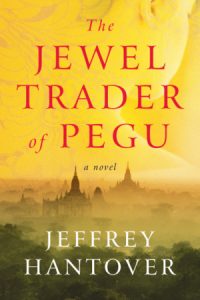Book Group Guide
The questions that follow are intended to enhance your group’s reading and discussion of THE JEWEL TRADER OF PEGU by Jeffrey Hantover.
Questions
1. Abraham is faced with the conflicting demands of heart and religious law: “Why do the law and one’s heart not always point in the same direction?” Following one undercuts the other. Is this conflict unique to his situation or does it have more universal resonance? In the conflict of law and heart is it farfetched to see a literary kinship between Abraham and Huckleberry Finn?
2. Abraham faces a series of choices in Pegu that give structure to the novel. Discuss those choices and the difficulty or ease with which he is able to make them.
3. Abraham writes to Joseph, “Perhaps my journey taken reluctantly may lead me as far inward as it has outward across oceans and desert. Perhaps I may return to Venice a better cartographer of my soul than if I had remained.” What is it about external travel that prompts and promotes inner journeys of self-discovery?
4. Mya did not travel as many miles to arrive in Pegu as Abraham, but she too takes a journey of changed perceptions, attitudes and self-awareness. Compare her inner journey with Abraham’s.5. It is difficult in historical novels to give voice to the voiceless, to those like Mya who didn’t leave diaries or letters or take actions that were the stuff of historical analysis. What are the challenges of giving voice to the voiceless, and in Mya has the author achieved in drawing a believable character with a developed interior life?
6. Buddhism is presented to the reader through Abraham who doesn’t fully understand it. We see it through his limited eyes. Does this hinder the reader’s full appreciation of the conflict between the two faiths or does it make his gradual acceptance of some of its principles all the more effective?
7. Abraham journeys from damning Win’s beliefs as superstition to a respect for Buddhist beliefs. As the circle of his experiences expand so does the vantage point from which he judges the beliefs of others. Can we be fully moral beings without stepping outside our own cultural values to judge the actions of others? And if we are able to see our beliefs in relative terms, can we still be guided by them or are we set adrift?
8. Stephen Fry, the English actor and author, said, “Well, we have to start somewhere, and if nothing else will lead us toward truth the loins may as well. Just as long as the heart and the mind follow and finally overtake, then maybe nothing has been lost.” What do you think he would have thought of Abraham and Mya’s journey from “loins” to love?
9. Is personal redemption a young person’s game or can we at any time in our lives, break the bonds of our character and redeem ourselves?
10. Abraham starts out as man longing to remain an observer of life but cannot escape taking action. Describe the forces that move him from observation to engagement. Is engagement a requirement of the moral life?
11. Abraham and Mya are divided by so much – religion, culture, language – and yet they fall in love and are willing to make wrenching sacrifices for each other. Is their love believable to you? If not, is that because of the author’s limitations or the mystery of love itself?

